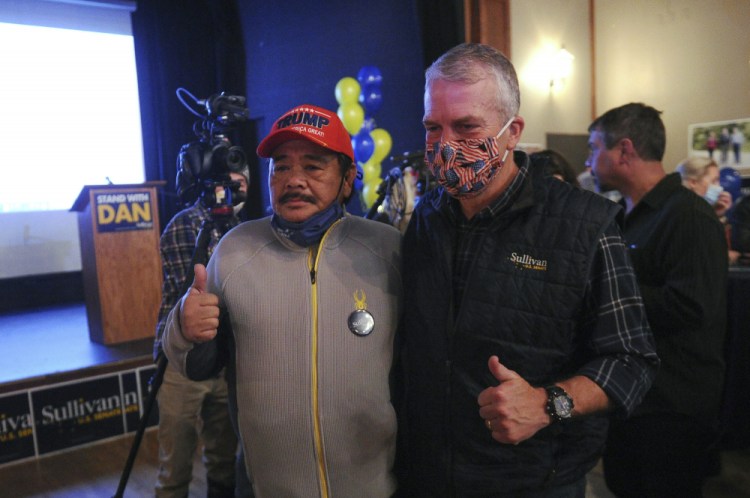WASHINGTON — Control of the Senate won’t be decided until the new year after Republicans won a seat in Alaska on Wednesday. Neither party can lock the majority until January runoffs in Georgia.
Incumbent Alaska Republican Sen. Dan Sullivan defeated Al Gross, an independent running as a Democrat.
With Democratic President-elect Joe Biden’s victory, Republicans are still short of the 51 seats they need for majority control. They have a 49-48 hold on the Senate with the Alaska win, but two races in Georgia are heading to a Jan. 5 runoff.
The race in North Carolina remains too early to call, but Democratic challenger Cal Cunningham has conceded to Republican Sen. Thom Tillis.
With Biden, the path to keeping Senate control is more difficult for Republicans. The vice president of the party in power, which on Jan. 20 will be Kamala Harris, is the tie-breaker. That means if Republicans only have 50 seats, Democrats control the Senate. Republicans would need 51 senators to overcome that.
The Georgia runoff elections, set for Jan. 5, are swiftly becoming a showdown over control of the chamber. The state is closely divided, with Democrats making gains on Republicans, fueled by a surge of new voters. But no Democrat has been elected senator in some 20 years.
Republican Sen. Kelly Loeffler will face Rafael Warnock, a Black pastor from the church where Rev. Martin Luther King, Jr. preached. And Republican Sen. David Perdue, a top Trump ally, will face Democratic challenger Jon Ossoff.
The Republicans in the top-tier races on Alaska’s ballot — President Trump, Sullivan and U.S. Rep. Don Young — held largely similar vote counts, and advantages, when Election Day results and early votes through Oct. 29 were tallied.
Sullivan predicted a win. But Gross, who said his campaign encouraged Alaskans to vote absentee, urged patience.
Election officials started counting more than 155,000 absentee, early and questioned votes on Tuesday and Sullivan maintained a large lead. The race drew outside attention and money with control of the Senate a factor.
Sullivan questioned Gross’ independent label and sought to tie him to Democratic members of Congress that Sullivan cast as out-of-touch with Alaska issues. Gross called Sullivan a Trump “yes man.”
The largest bloc of registered voters in Alaska identify as independents, though the state has leaned Republican, sending one Democrat to the Senate since 1980: Mark Begich. Begich, who served a term, narrowly lost to Sullivan in 2014, another year when Senate control was at stake.
Financial disclosures through mid-October showed Gross had raised $16.9 million, compared to $9.8 million for Sullivan this election cycle.
Sullivan said a takeaway from reelection wins by colleagues, such as Republican Sens. Lindsey Graham of South Carolina and Joni Ernst of Iowa “is a theme that I think’s going to be the theme of our race, which is, all the money in the world can’t buy an election.”
Send questions/comments to the editors.



Success. Please wait for the page to reload. If the page does not reload within 5 seconds, please refresh the page.
Enter your email and password to access comments.
Hi, to comment on stories you must . This profile is in addition to your subscription and website login.
Already have a commenting profile? .
Invalid username/password.
Please check your email to confirm and complete your registration.
Only subscribers are eligible to post comments. Please subscribe or login first for digital access. Here’s why.
Use the form below to reset your password. When you've submitted your account email, we will send an email with a reset code.